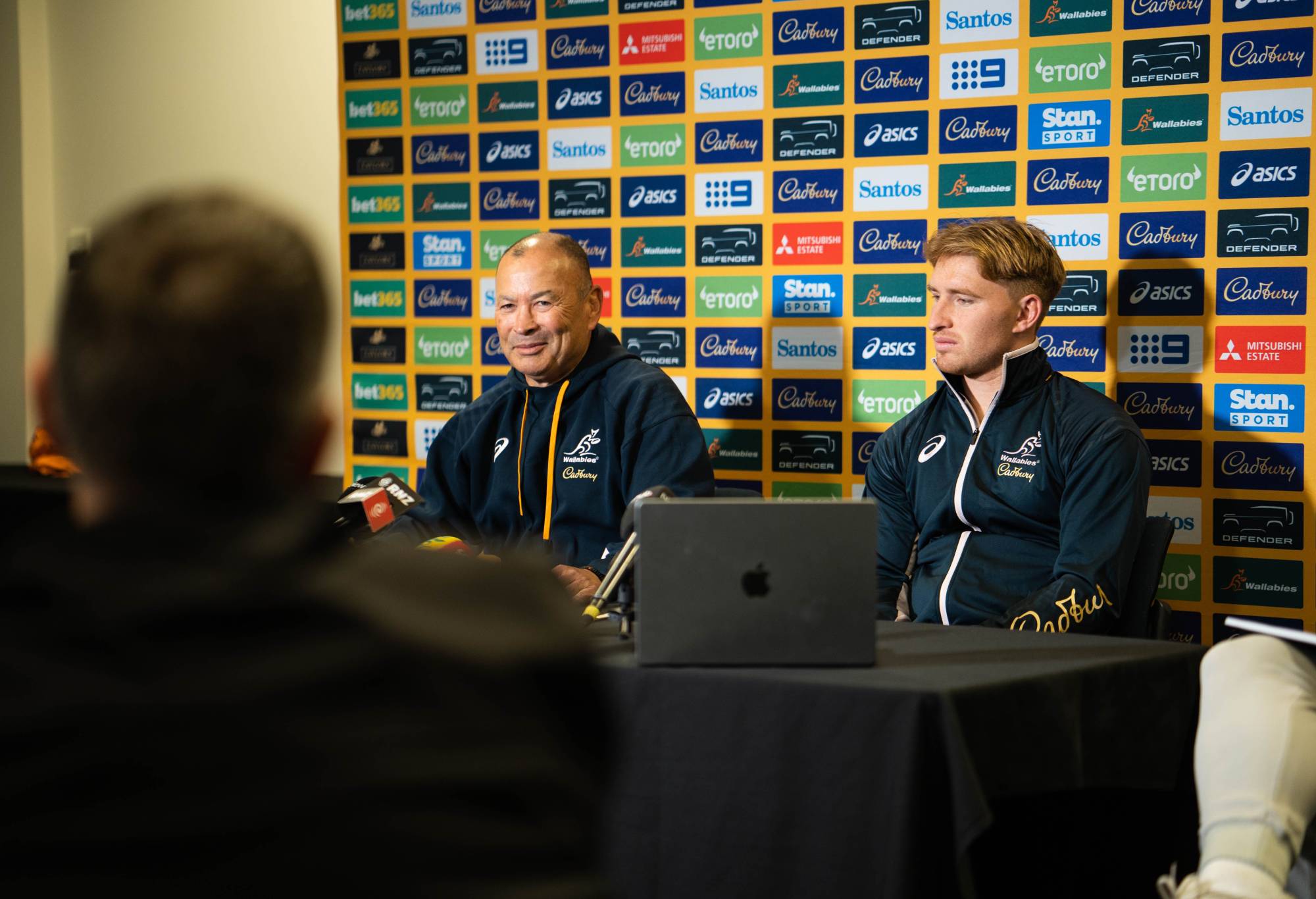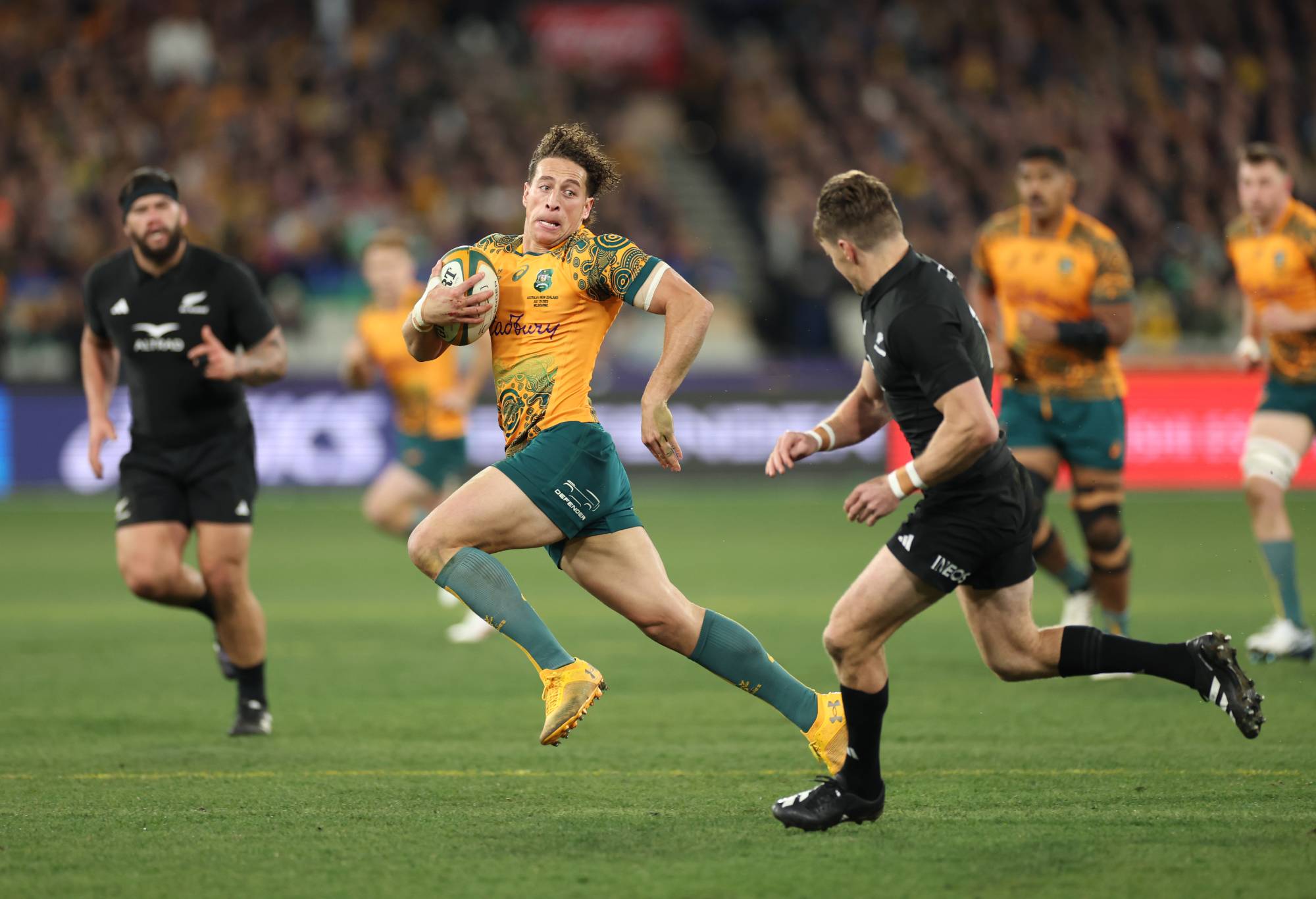Eddie Jones has been talking about attacking rugby being the feature of the 2023 World Cup in France for years.
“It is about developing a new England side that we want to equip to win the World Cup,” said Jones in early 2022.
“The World Cup in France is reasonably unique because you are going to be playing the majority of the pool games and up to the quarter-final on fast, open pitches.
“I think, to progress to the last four, you are going to need to have a very good attacking game. Once you get to Stade de France [where the semi-finals and final are to be played], things tighten up a bit. The ball is always moist, the ground is always slower. It is a heavy surface, and it becomes more attritional.
“We need to be able to play the old England way and the new England way. And what we are trying to develop is this new England way of playing and finding the players to play it. It is about being aggressive, about taking opportunities as they avail themselves and getting on the front foot against the opposition.”

Eddie Jones has long insisted that the 2023 World Cup would be defined by attack. (Photo by Chris Hyde/Getty Images)
One of rugby’s great minds, a figure who has a 90 per cent win record across four World Cup campaigns, Jones has always attempted to get ahead of the curve and predict what campaigns will be defined by.
With World Rugby intent on speeding the game up, especially around the ruck, to make it a more viewer-friendly game, Jones has long thought attack, at least at the early stages of the tournament, with the sun strong and the grounds firm in the spring, would feature prominently.
Back at the turn of the century, Jones was doing the same with the Brumbies. Together with Rod Kafer, the Brumbies changed their attacking shape in 2020 and came within an inch of winning their maiden Super Rugby title.
Having played their cards ahead of the finals in Christchurch, they were taught a harsh lesson by the Crusaders in the final and were beaten.
A year later, they crushed the Sharks off the back of once again getting ahead of the curve.
Upset semi-final successes in 2003 and 2019 against the All Blacks speak of a coach who meticulously plans for World Cups and what it takes to reach a final. The rest, as history shows, hasn’t quite gone to script.
Over the past two months, Jones has torn up the Wallabies’ playbook, which had been infiltrated by the New Zealand-isation that has infiltrated Australian rugby.
As halfback Tate McDermott – the best heads-up halfback and playmaker in Australia – mentioned on Thursday, Jones has blown up the pod systems that had become the norm.
“If you compare Eddie to Thorny [former Reds coach Brad Thorn], to [ex-Wallabies coach] Dave Rennie, they’re all very different people. So, it’s hard to call to say one’s this way, one’s the other,” McDermott said.
“But what Eddie has done, particularly the playmakers, we can’t play with blindfolds on. We can’t play to a structure because the pictures in front of us are always changing.
“Eddie’s put that decision-making front and centre of what we do at training. There’s a lot of scenario-based training and, I guess, a lot of reaction-based stuff.
“At the start it was a very big shift to what we were used to coming out of the Super Rugby clubs. It’s all very three-phase focus. You have to be here, you have to hit this breakdown. So we missed roles at the start (of The Rugby Championship), but once we understood that this is the way forward for us and this is what will get us to the top, we started to see a change in behaviours and good behaviours as well.
“We’ll continue to go down that path too because we truly believe that’s the right path. Eddie has definitely changed things for the better.”

Tate McDermott believes the Wallabies have discovered their DNA under Eddie Jones. (Photo credit: Julius Dimataga/RugbyAU Media)
Having grown up surrounded by the instinctive delights of Mark Ella and his gifted brothers Glen and Gary, Jones knows what Australian rugby, dare I say it, Randwick rugby is all about.
But decades on from the amateur era, he also knows that he has an explosive and dynamic forward pack that can blow open oppositions and allow his young, athletic backs to use the ball.
The Roar understands that from very early in the piece that Jones arrived back as Wallabies coach, he told wrecking-ball prop Taniela Tupou to not concentrate his time on hitting rucks. Instead, Jones wanted his 140kg giant to focus on explosiveness at the carry and scrummaging straight.
Ditto Angus Bell, who has been phenomenal since returning from successive foot injuries.
Understanding the various points of difference for the Wallabies, whose demographic has shifted over the years, to cater for the explosive nature of the current crop is key to understanding the plan put in place by Jones.
It seems evident that Jones, having been sacked by the Rugby Football Union after the robotic, structured nature of English rugby didn’t quite click with the Australian’s vision about where the game was heading, has found a match made in heaven with the Wallabies.
“We’ve seen the intensity of the game really increase, the ball in play, particularly against the bigger countries, your France and South Africa, ball in play is really low, but the periods of play are so intense. You can’t afford to make a mistake in that period of play which suits a big forward pack like us,” Jones said on Thursday.
“That really suits us. I never would have dreamt of coming to a press conference as a coach of Australia saying we’ve got a huge pack that could dominate the World Cup and we have and we intend to use that to our advantage.
“We’ve got a really big, strong, fast pack that’s ready to take on the opposition and that starts with Georgia. And then then you know, you get this almost like roller bird type play.
“Then you get one opportunity with your backs to take advantage of it and that’s where you got to be so clinical, your running lines and passing and your support players got to be so good at taking those opportunities. And we’re starting to develop that. [Samu] Kerevi coming back gives us another option, which we haven’t had…
“He gives us another big running threat out wider, [Jordan] Petaia is starting to find his feet. We’re blessed with three great wingers two will start and one off the bench that can win anything in the air.
“We look like a team that can score from a number of different places and a number of different sources.
“We’re at the starting line now. Everyone starts on the same spot now. Some teams have had about six months preparation, some teams have been together four years, some teams have been together eight years. But we’re all on the same starting line. We all go together.”

Eddie Jones during a Wallabies training session ahead of the Rugby World Cup France 2023 at Stade Roger Baudras on August 31, 2023 in Saint-Etienne. (Photo by Chris Hyde/Getty Images)
Nor does Jones believe the Wallabies could copy any other nation’s ideas around attack.
“Well, the plan was always to free us up from structure,” he said last week.
“I don’t believe you can copy other teams’ structure, you’ve got to come up with your own way of playing. And so that’s always been the goal.
“Initially, we probably didn’t get it right in how we wanted it to play. Well, we didn’t get it right, and now we’re finding the way that we should play.”
McDermott says the Wallabies needed to discover their DNA – and, at last, have.
“I feel like we had to find an identity,” he said.
“We felt like we’ve found that, a game model that’s built around our strengths individually and probably a less structured model.
“What you’re seeing is a complete buy-in from the whole team. And whilst we haven’t put it together for 80 minutes, there’s definitely, particularly on the training paddock, there’s a hunger and a desire to put it together. And every week we’ve gotten better.
“The scoreboard didn’t reflect that against France but all the other stats reflected that we would put it in a better performance against the Kiwis in Dunedin. So, for us, there’s a sense of belief.
“It’s tough to get that belief in teams I’ve been in the past where we’ve lost five in a row, but you wouldn’t even expect that we’ve lost five in a row with the confidence that’s beaming around the group at the moment.”
While running and using the ball will be on show, a key element to the new Wallabies game plan is a return to using their powerful and aerial threats Suliasi Vunivalu and Mark Nawaqanitawase.
Over the past month, Australian audiences have seen the Wallabies use that threat from both kick restarts and in general play.

Mark Nawaqanitawase’s free and threat on both the ground and in the air has given Eddie Jones another strike weapon. (Photo by Mackenzie Sweetnam/Getty Images)
It’s a weapon the Wallabies barely scratched the surface with when Israel Folau was in the air.
While he was used prolifically and effectively for the Storm and Queensland Maroons in rugby league, the decision to play Folau at fullback saw his biggest threat deweaponised.
Indeed, his stunning leap against Scotland in Sydney in 2017 was the exception, not the norm.
Now, the Wallabies look set to re-emerge as an attacking and triple threat by using their aerial weapons out wide.
After Nawaqanitawase was effectively used in the air in Dunedin, both he and Vunivalu dominated the aerial battle against Les Bleus at the Stade de France.
Vunivalu climbed high once just shy of halfway to get the ball back, while he scored his first try in the minutes before full time as he brilliantly ran onto Issak Fines-Leleiwasa’s well-placed box kick on the attacking opposition 22 and used his body to score his first try.
Almost 20 minutes earlier, Nawaqanitawase managed to win possession back from a similarly well-executed and effective box kick from starting halfback McDermott, as the Wallabies scored their second try of the match.
Both moments were examples of what Jones has spoken about regularly since talking about the necessity of kicking – and winning the plaudits as a result.
“I had a wonderful dinner in Paris on Wednesday night, this French guy came up to me and he said, ‘I love how France play now. I love how they play because they don’t kick the ball anymore,’” Jones recalled.
“[But] they’re the highest kicking side in the world France, so people have perceptions of how teams play. And when you’re winning, the perception is a positive perception.”
The Wallabies won’t be the finished product when they take to the field against Georgia. But they don’t need to either given the long seven-week campaign ahead.
Yet, the Wallabies at least have a clear plan of how they want to play.
It’s not just built on the direction Jones thought the World Cup would move, but it plays at the heart of how the Wallabies want to play. Free without the burden of rigidness.
































































































